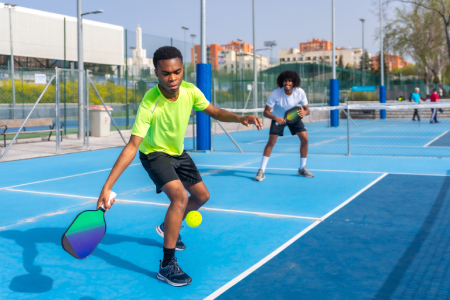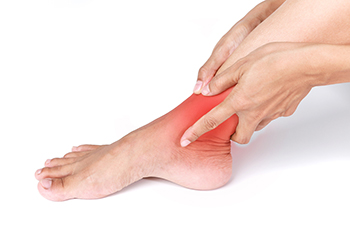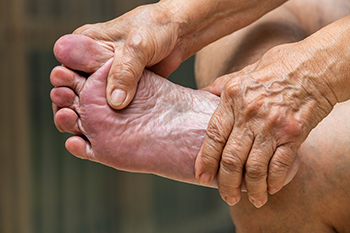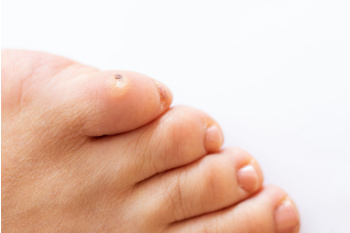January 2025
Are You Suffering From Ingrown Toenails?
Foot Pain Risks From Playing Pickleball

Pickleball is a fast-paced, enjoyable sport, but its quick changes in direction and repetitive movements can take a toll on the feet. Players often make sudden stops, pivots, and sprints, which can put stress on the foot joints and muscles. The repetitive nature of the sport can lead to foot pain, especially in the arches, heels, and balls of the feet. Improper footwear is a common cause of foot discomfort, as shoes that lack proper support, cushioning, or stability can worsen the strain on the feet. Additionally, failing to warm up properly before playing pickleball can increase the risk of injury, as muscles and tendons are not fully prepared for the intensity of the movements. To prevent foot pain, it is essential to wear shoes specifically designed for pickleball, practice proper warm-up routines, and listen to your body when it signals discomfort. If you have foot or ankle pain from playing pickleball, it is suggested that you promptly consult a podiatrist who can help you with effective relief and treatment solutions.
Ankle and foot injuries are common among athletes and in many sports. They can be caused by several problems and may be potentially serious. If you are feeling pain or think you were injured in a sporting event or when exercising, consult with Dr. Thomas Madden from Advanced Foot Care Center. Our doctor will assess your condition and provide you with quality foot and ankle treatment.
Common Injuries
The most common injuries that occur in sporting activities include:
- Achilles Tendonitis
- Achilles Tendon Rupture
- Ankle Sprains
- Broken Foot
- Plantar Fasciitis
- Stress Fractures
- Turf Toe
Symptoms
Symptoms vary depending upon the injury and in some cases, there may be no symptoms at all. However, in most cases, some form of symptom is experienced. Pain, aching, burning, bruising, tenderness, tightness or stiffness, sensation loss, difficulty moving, and swelling are the most common symptoms.
Treatment
Just as symptoms vary depending upon the injury, so do treatment options. A common treatment method is known as the RICE method. This method involves rest, applying ice, compression and elevating the afflicted foot or ankle. If the injury appears to be more serious, surgery might be required, such as arthroscopic or reconstructive surgery. Lastly, rehabilitation or therapy might be needed to gain full functionality in the afflicted area. Any discomfort experienced by an athlete must be evaluated by a licensed, reputable medical professional.
If you have any questions, please feel free to contact our office located in Killeen, TX . We offer the newest diagnostic and treatment technologies for all your foot care needs.
Causes and Symptoms of Ankle Pain Without Swelling

Experiencing ankle pain without swelling can be frustrating and may occur for several reasons. One common cause is overuse or repetitive strain, especially from activities such as running, walking, or sports. This type of pain may affect the tendons or ligaments in the ankle, leading to discomfort without visible swelling. Another possibility is a mild sprain or strain where the tissues are stretched or torn, but the inflammation does not result in noticeable swelling. Additionally, issues like tendinitis or bursitis can cause pain in the ankle without swelling. These conditions involve inflammation of the tendons or bursa, but may not always produce the swelling typically seen with injuries. Stress fractures, which are small cracks in the bone, can also cause pain without swelling. Symptoms of this type of pain may include tenderness, discomfort during movement, and occasional stiffness. If the ankle pain persists, it is suggested to seek medical attention from a podiatrist for a proper diagnosis and treatment.
Ankle pain can have many different causes and the pain may potentially be serious. If you have ankle pain, consult with Dr. Thomas Madden from Advanced Foot Care Center. Our doctor will assess your condition and provide you with quality foot and ankle treatment.
Ankle pain is any condition that causes pain in the ankle. Due to the fact that the ankle consists of tendons, muscles, bones, and ligaments, ankle pain can come from a number of different conditions.
Causes
The most common causes of ankle pain include:
- Types of arthritis (rheumatoid, osteoarthritis, and gout)
- Ankle sprains
- Broken ankles
- Achilles tendinitis
- Achilles tendon rupture
- Stress fractures
- Tarsal tunnel syndrome
- Plantar fasciitis
Symptoms
Symptoms of ankle injury vary based upon the condition. Pain may include general pain and discomfort, swelling, aching, redness, bruising, burning or stabbing sensations, and/or loss of sensation.
Diagnosis
Due to the wide variety of potential causes of ankle pain, podiatrists will utilize a number of different methods to properly diagnose ankle pain. This can include asking for personal and family medical histories and of any recent injuries. Further diagnosis may include sensation tests, a physical examination, and potentially x-rays or other imaging tests.
Treatment
Just as the range of causes varies widely, so do treatments. Some more common treatments are rest, ice packs, keeping pressure off the foot, orthotics and braces, medication for inflammation and pain, and surgery.
If you have any questions, please feel free to contact our office located in Killeen, TX . We offer the newest diagnostic and treatment technologies for all your foot care needs.
Common Foot Problems Among Seniors

As people age, foot health becomes increasingly important, as the feet undergo changes that can lead to various problems. Older feet require extra care due to factors such as reduced circulation, decreased skin elasticity, and the natural wear and tear on bones and joints. Seniors often experience foot conditions like arthritis, which causes pain and stiffness in the joints, as well as bunions, a deformity that develops at the base of the big toe. Additionally, poor circulation can lead to conditions like swelling or cold feet, while thinning skin increases the risk of cuts and infections. Many older adults also develop toe problems like hammertoes, corns, and calluses. Proper footwear, regular foot inspections, and professional foot care are essential in preventing these issues from worsening and maintaining mobility and overall foot health. If you are a senior, it is suggested that you schedule regular visits with a podiatrist who can effectively monitor your foot health.
Proper foot care is something many older adults forget to consider. If you have any concerns about your feet and ankles, contact Dr. Thomas Madden from Advanced Foot Care Center. Our doctor can provide the care you need to keep you pain-free and on your feet.
The Elderly and Their Feet
As we age we start to notice many changes in our body, but the elder population may not notice them right away. Medical conditions may prevent the elderly to take notice of their foot health right away. Poor vision is a lead contributor to not taking action for the elderly.
Common Conditions
- Neuropathy – can reduce feeling in the feet and can hide many life-threatening medical conditions.
- Reduced flexibility – prevents the ability of proper toenail trimming, and foot cleaning. If left untreated, it may lead to further medical issues.
- Foot sores – amongst the older population can be serious before they are discovered. Some of the problematic conditions they may face are:
- Gouging toenails affecting nearby toe
- Shoes that don’t fit properly
- Pressure sores
- Loss of circulation in legs & feet
- Edema & swelling of feet and ankles
Susceptible Infections
Diabetes and poor circulation can cause general loss of sensitivity over the years, turning a simple cut into a serious issue.
If you have any questions please feel free to contact our office located in Killeen, TX . We offer the newest diagnostic and treatment technologies for all your foot and ankle needs.
Understanding Corns and Calluses

Corns and calluses are thickened areas of skin that develop due to repeated friction or pressure, often on the feet. Corns typically form on the toes, while calluses appear on the soles. Common causes include ill-fitting shoes, high-impact activities, and foot deformities. Symptoms include localized pain, discomfort, and thick, hardened skin. While these conditions are not usually serious, they can lead to further foot problems if left untreated. Treatment options include regular exfoliation, moisturizing, and using protective pads. In more persistent cases, a podiatrist can provide professional care, such as safely removing corns and calluses and addressing any underlying issues. If you are struggling with corns or calluses, it is suggested that you make an appointment with a podiatrist. This foot doctor can develop a personalized treatment plan to relieve your discomfort and help you maintain healthy feet.
Corns can make walking very painful and should be treated immediately. If you have questions regarding your feet and ankles, contact Dr. Thomas Madden of Advanced Foot Care Center. Our doctor will treat your foot and ankle needs.
Corns: What Are They? And How Do You Get Rid of Them?
Corns are thickened areas on the skin that can become painful. They are caused by excessive pressure and friction on the skin. Corns press into the deeper layers of the skin and are usually round in shape.
Ways to Prevent Corns
There are many ways to get rid of painful corns such as:
- Wearing properly fitting shoes that have been measured by a professional
- Wearing shoes that are not sharply pointed or have high heels
- Wearing only shoes that offer support
Treating Corns
Although most corns slowly disappear when the friction or pressure stops, this isn’t always the case. Consult with your podiatrist to determine the best treatment option for your case of corns.
If you have any questions please feel free to contact our office located in Killeen, TX . We offer the newest diagnostic and treatment technologies for all your foot and ankle needs.





